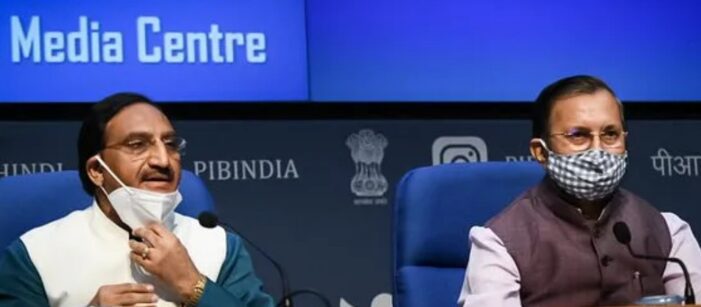India’s Union Minister for Human Resource Development Ramesh Pokhariyal ‘Nishank’ has unveiled the National Education Policy 2020 aimed at bringing transformational reforms in school and higher education systems in the country.
Speaking at media briefing in New Delhi Wednesday, after Cabinet gave its approval to the New Education Policy 2020, the HRD Minister said that the NEP was drawn up after consultation and discussion process. He said 2.25 lakh suggestions have been received after the draft was placed in public domain for consultations.
Nishank said that this National Education Policy 2020 will bring transformational reforms in both school and higher education sectors. He said that NEP2020 will ensure universal access to high-quality Early Childhood Care & Education across India. “We will focus on developing social capacities, sensitivity, good behaviour, ethics, teamwork and cooperation among children through a joyful pedagogy,” he added.
The new NEP will replace 34-year-old National Policy on Education (NPE), 1986. MoS for HRD Ministry Sanay Dhotre said that the NEP 2020 is most comprehensive, radical and futuristic and does not recognise any barrier in bringing quality and outcome-based education to each and everyone. It now includes children during their most foundational years, that is 3-5 years, for their care and education.
Critical thinking, experiential and application-based learning, flexibility in learning, focus on life skills, multidisciplinary, and continuous review are some of the salient features of this policy, he noted. Bringing back 2 crore out-of-school and drop-out children and universalisation of school education from 3 years onwards — reflect commitment to the philosophy of ‘no one to be left behind’, he said.
Here are the Highlights of NEP 2020:
1. 10+2 board structure will be dropped
2. New school structure will be 5+3+3+4
3. Upto 5 pre school, 6 to 8 Mid School, 8 to 11 High School , 12 onwards Graduation
4. Any Degree will be 4 years
5. 6th std onwards vocational courses available
6. From 8th to 11, students can choose subjects
7. All graduation course will have major and minor. A science student majoring in Physics can choose Music as minor.
8. All higher education will be governed by only one authority
9. UGC and AICTE (technical and MBA education) will be merged
10. All University, government, private, Open, Deemed, Vocational institutions will have same grading system and rules.
11. New Teacher Training board will be setup for all kinds of teachers, no state can change
12. Same level of Accreditation to any collage. Based on rating, colleges get autonomous rights and funds
13. New learning program for parents to teach children up to 3 years at home and for pre-school 3 to 6
14. Multiple entry and exit from any course
15. Credit system for graduation for each year. If a student takes break, he can come back again to complete course
16. All school exams will be semester wise twice a year
17. The syllabus will be reduced to core knowledge of any subject
18. More focus on student’s practical and application knowledge
19. For any graduation course, if student completes only one year he will get a basic certificate, if he completes two years, then he will get Diploma certificate and if he completes full course, then he will get degree certificate. No year loss for any student.
20. All the graduation courses in Universities will be governed by single authority.

